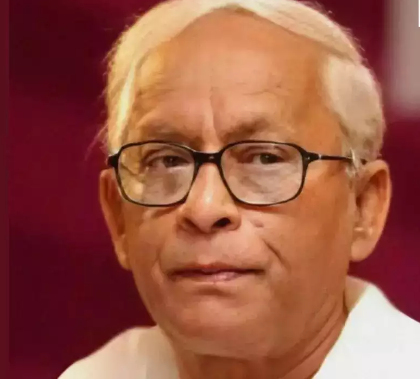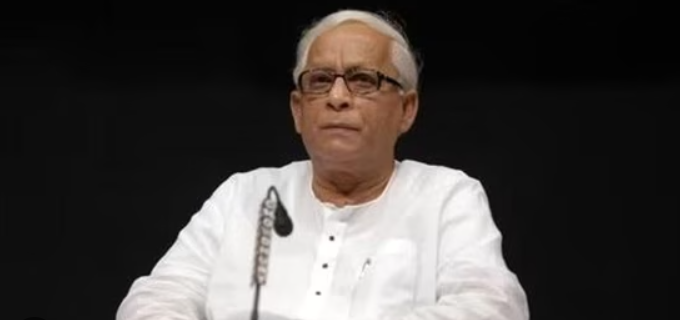Buddhadeb Bhattacharjee, Former Chief Minister of West Bengal;-
Kolkata, August 2024 – Buddhadeb Bhattacharjee, the former Chief Minister of West Bengal and a towering figure in Indian politics, passed away on [specific date] at the age of 80. Known for his intellectual prowess, political acumen, and commitment to leftist ideology, Bhattacharjee’s demise marks the end of an era in West Bengal’s political landscape. His contributions to the state and the country have left an indelible mark, and his legacy will be remembered for generations to come.
Early Life and Political Journey
Buddhadeb Bhattacharjee was born on March 1, 1944, in Calcutta (now Kolkata), into a middle-class family. He was educated at the prestigious Presidency College, Kolkata, where he developed a deep interest in Marxist ideology and politics. His political journey began in the 1960s when he joined the Communist Party of India (Marxist) [CPI(M)].
Bhattacharjee quickly rose through the ranks of the party, known for his eloquence, intellect, and dedication to the communist cause. By the late 1970s, he had established himself as a significant figure within the CPI(M), which was then gaining prominence in West Bengal.
Rise to Power
In 1977, the CPI(M)-led Left Front came to power in West Bengal, marking the beginning of an unprecedented 34-year rule. Buddhadeb Bhattacharjee was appointed as the Minister for Information and Cultural Affairs, a position he held with distinction. His tenure was marked by efforts to promote Bengali culture and literature, aligning with his personal passion for the arts.
In 2000, Bhattacharjee succeeded Jyoti Basu as the Chief Minister of West Bengal. This transition marked a significant shift in the leadership style of the state. While Basu was known for his pragmatic approach, Bhattacharjee was seen as more ideologically driven and reform-oriented. His tenure as Chief Minister was characterized by efforts to modernize the state’s economy and infrastructure, although these initiatives were often met with resistance both within and outside his party.
Economic Reforms and Controversies
Bhattacharjee’s tenure as Chief Minister is perhaps best remembered for his ambitious economic reforms. Recognizing the need to attract investment to spur economic growth, he pursued policies aimed at industrialization and modernization. One of his most notable initiatives was the effort to attract investment from Tata Motors to set up a car manufacturing plant in Singur. However, this move led to widespread protests and controversy.
The opposition, led by Mamata Banerjee and her Trinamool Congress (TMC), capitalized on the discontent among farmers and landowners who were opposed to the land acquisition for industrial projects. The Singur and Nandigram agitations became significant flashpoints, leading to violent clashes and widespread unrest. The handling of these issues became a major factor in the eventual decline of the Left Front’s popularity.  for more information click on this link
for more information click on this link
Cultural and Educational Contributions
Despite the controversies, Bhattacharjee’s contributions to culture and education remain significant. He was an avid reader, writer, and a patron of the arts. Under his leadership, Kolkata continued to thrive as a cultural hub, hosting numerous literary and cultural festivals. Bhattacharjee’s passion for literature was evident in his own writings, including poetry and essays that reflected his deep understanding of Marxist theory and Bengali culture.
His tenure also saw significant investments in education. The state government focused on improving the quality of education at all levels, from primary schools to universities. Initiatives to enhance literacy rates and access to education for marginalized communities were prioritized. Bhattacharjee believed that education was a critical tool for social and economic development, and his policies reflected this conviction.
Health Issues and Retirement
In the latter part of his career, Bhattacharjee’s health began to decline. He suffered from chronic obstructive pulmonary disease (COPD) and other age-related ailments. Despite his health challenges, he remained active in politics and continued to be a guiding force for the CPI(M).
In 2011, after a historic electoral defeat for the Left Front, Bhattacharjee stepped down as Chief Minister. The defeat marked the end of the Left Front’s 34-year rule in West Bengal and the rise of Mamata Banerjee’s TMC. Following his retirement, Bhattacharjee largely withdrew from active politics, although he continued to be a respected voice within the CPI(M) and among his supporters.  for more information click on this link
for more information click on this link
Legacy and Impact
Buddhadeb Bhattacharjee’s legacy is complex and multifaceted. He is remembered as a principled leader who dedicated his life to the ideals of Marxism and the betterment of West Bengal. His intellectual contributions to politics and culture have left a lasting impact.
Bhattacharjee’s efforts to modernize West Bengal’s economy, although controversial, were driven by a vision to transform the state into a hub of industry and innovation. His tenure highlighted the challenges of balancing industrial development with the rights and concerns of farmers and local communities. The debates and discussions that emerged during his time in office continue to influence policy decisions and political discourse in West Bengal.
On a cultural level, Bhattacharjee’s passion for literature and the arts enriched the cultural fabric of Kolkata and the state. His support for cultural initiatives and institutions helped preserve and promote Bengali heritage. His writings, marked by their depth and insight, continue to be read and appreciated by scholars and enthusiasts of Bengali literature.
Tributes and Condolences
As news of Bhattacharjee’s passing spread, tributes poured in from across the political spectrum. Leaders from various political parties, intellectuals, and ordinary citizens expressed their condolences and remembered his contributions.
Mamata Banerjee, the current Chief Minister of West Bengal, stated, “Buddhadeb Bhattacharjee was a towering figure in West Bengal’s political landscape. His dedication to the state and his contributions to its cultural and educational development will always be remembered. My heartfelt condolences to his family and supporters.”
Sitaram Yechury, General Secretary of the CPI(M), said, “Comrade Buddhadeb Bhattacharjee was a true Marxist and a committed leader. His intellectual contributions and his efforts to modernize West Bengal’s economy have left an indelible mark. We have lost a great leader and a guiding force.”
The literary and cultural communities also mourned his loss. Renowned Bengali writer and poet Shankha Ghosh remarked, “Buddhadeb Bhattacharjee was not just a politician but a man of letters. His deep understanding of Bengali literature and culture enriched our society. His presence will be sorely missed.”  for more information click on this link
for more information click on this link
Final Journey
Buddhadeb Bhattacharjee’s final journey was marked by a state funeral attended by thousands of people from all walks of life. The funeral procession, which passed through the streets of Kolkata, saw an outpouring of grief and respect from citizens. Flags were flown at half-mast, and a day of mourning was declared by the state government.
In his last rites, Bhattacharjee was given a solemn farewell, with leaders from various political parties, cultural icons, and ordinary citizens paying their respects. The sense of loss was palpable as West Bengal bid farewell to one of its most influential leaders.
Conclusion
Buddhadeb Bhattacharjee’s life and career were marked by a steadfast commitment to his principles and a vision for a better West Bengal. His tenure as Chief Minister was a period of significant change and challenge, and his efforts to balance economic development with social justice continue to be a topic of discussion and debate.
As West Bengal moves forward, the legacy of Buddhadeb Bhattacharjee will continue to inspire and guide future generations. His contributions to politics, culture, and education have left an enduring impact, and his memory will be cherished by those who knew him and those who continue to be inspired by his work.
In the words of Bhattacharjee himself, “The journey of progress is never easy, but it is the only path that leads to a better tomorrow.” His life and legacy exemplify this belief, and his contributions will continue to shape the future of West Bengal for years to come. ALSO READ:- Dissolution of Bangladesh Parliament and the Proposal of Muhammad Yunus as Interim Leader




